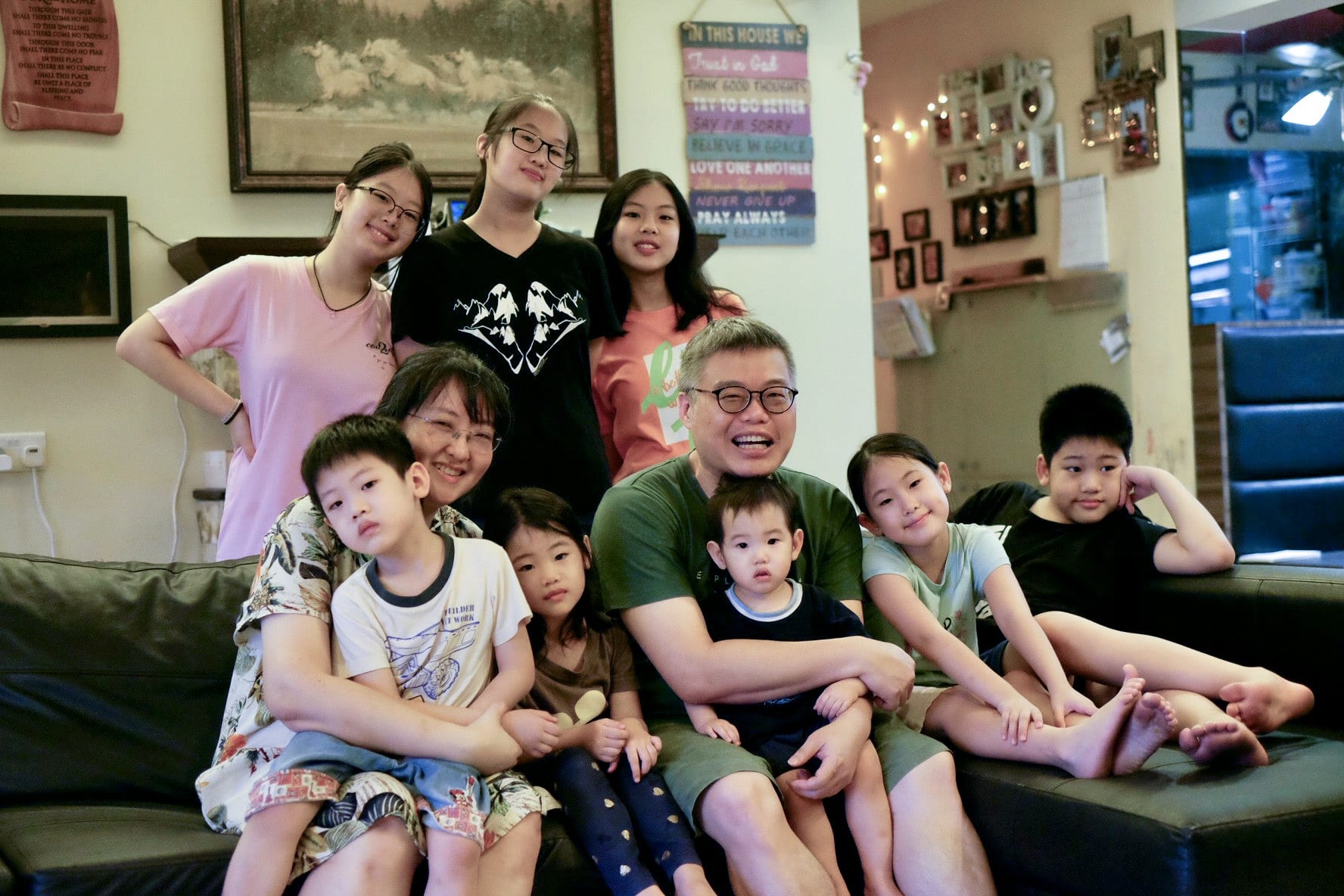

When the Sees, a family of 10, were recently featured in The Straits Times, some netizens thought that raising eight kids on a budget meant that each kid was deprived of a good quality of life.
Eldest child Ariel, 16, strongly disagreed.

Sisters Lael and Ariel sharing a light-hearted moment with their mum, Karen, as they discuss some of the negative comments they read after The Straits Times article was published.
“Some people felt that we ‘very poor thing’. But actually, we’re quite okay. We’re quite happy too.
“We have a life in here.”
Her younger sister Lael, 12, agreed.
Michael See and his wife Karen are both 46. They married in 2002 when they were 26.
Michael teaches in a specialised school for academically weaker students. Karen is a stay-at-home mum.

All the See children are from individual pregnancies; there are no twins or triplets.
Their children – from youngest to oldest – are Joel, Iriel, Gabriel, Zuriel, Samuel, Lael, Katriel and Ariel. They range from one to 16, and were born two or three years apart.
How does a big family like the Sees cope with the high cost of living in Singapore, especially with Michael being the sole breadwinner?
For starters, both Michael and Karen are careful to save money where they can, and have taught the kids to spend wisely.
One way is to wait for certain items to go on sale before buying them.

Samuel (right) and Gabriel (centre) excitedly show our photographer their favourite books. Zuriel joins in on the fun.
When the kids want to buy something new, they know their parents will usually ask them: “How useful will this item be in your life?” or “Will you discard it after a short while?”
“Home is fine. Home is where my butt lives.”
Such questions help the children to think before they spend.
The Sees also have no car, no childcare or extra tuition for the kids, and no domestic helper. Enrichment activities are generally swimming lessons at the neighbourhood pool.
The children also inherit their parents’ mobile phones and receive hand-me-down clothes from their siblings.

Playtime among the siblings is often action-packed.
While some onlookers may judge the family to be poor in material luxuries, the See children are rich in joy in their lively and loving household.
“Home is fine. Home is where my butt lives,” quipped Katriel, causing her sisters to burst into laughter.
While the Sees live frugally, no one is under-fed.

Katriel, 14, hands out some tasty pretzels to her younger brother Gabriel, 5.
The family explained how The Straits Times article – “Feeding 8 kids on $300 a week” – caused some readers to misunderstand their living situation.
Actually, the $300 refers only to grocery expenses and not to the family’s total spending per month.
They spend about $300 for utilities, $200 for internet and phone bills, $1,000 for insurance, $500 for transport, and $500 for eating out as a family about three times a month.
Michael and Karen are grateful for how God has helped them meet their needs – often in unexpected ways.
Michael shared how, 12 years ago, they were able to sell their five-room Punggol flat and move into a larger jumbo one without spending any extra money.
“This owner took our offer even though it was some $40,000 lower than another offer,” said Michael. “She liked our kids, who reminded her of her own.”

Ariel’s 4sq m room, complete with a gamer’s chair. Her father had the area specially partitioned to give her the space and privacy she requested when she turned 16.

Each of the other air-conditioned bedrooms are shared by two children; visits from other siblings are allowed.
There is now enough room for everyone.
Baby Joel sleeps with his parents while Ariel enjoys a cosy personal space partitioned from the living area. Each of the remaining air-conditioned bedrooms is shared by two siblings.
Michael and Karen encourage their kids to work hard at what they do.
However, they do not pressure the children to get straight A’s. Never mind that they attend “branded” schools because they are their parents’ alma mater.
“The process of trying is always more important. We love our kids, no matter what results they get.”
“Our kids are okay in their studies,” said Michael.
“We don’t really set expectations for their results so long as they try their best.
“The process of trying is always more important than the results. We love our kids, no matter what results they get.”

Michael spending one-on-one time with Samuel, 10, answering the young one’s questions about the family album.
Both parents also spend one-on-one time with each child to better love and speak to their different personalities and preferences.
“One-on-one time means giving the child the full attention that he or she deserves – without the distraction of a mobile phone,” explained Michael.
“It is different from asking if the child has eaten, or if he has finished the homework assigned.
“We always try to go deeper, ask more, tell more, share more.”
The Sees believe that teaching their children good lifelong values is far more important than simply chasing material things or good grades.
“Values education is way more important than results, enrichment and tuition,” said Michael.

Instead of being glued to their phones, the See kids entertain themselves with books and games with each other.
Inspired by the Bible, these values include treating others with love, respect, and compassion.
Michael recalled a few proud parenting moments.
“If my kids are getting A’s but not caring for the community, I’ll be the saddest dad in Singapore.”
During Ariel’s Primary School Leaving Examination (PSLE) period, she chose to pay her respects at the wake of her parents’ friend, even though she had an exam the next day.
The week before, she had spent a few hours with her family distributing care packages to low-income families instead of staying home to study.
“I was secretly happy,” admitted Michael. “She understood there are things in life which are more important than studies and results.”
“If my kids are getting A’s but not caring for the community or doing good work to help low-income families, I’ll be the saddest dad in Singapore.”
“If you want the kids to do something, be prepared to do it yourself,” said Michael.
Before Covid-19, the parents invited their kids to join them in distributing groceries and toiletries to low-income families through Metropolitan YMCA’s MY Manna programme.
Michael also greeted cleaners and bus captains until the kids saw it as “normal”. He also bought drinks and gave them to the cleaners.
“They will do the same, in time,” he said.
“I started buying drinks and giving them to the cleaners. My kids see it then they will follow. They know it is the right thing to do.”
“Some things are best caught, not taught,” he said.
Their older kids also guide the younger ones when it comes to chores.
“For instance, Gabriel follows his elder sister Zuriel into the kitchen to watch her prepare the broccoli,” said Michael.
“He is eager to be promoted to ‘broccoli manager’ when he enters Primary One next year.”

Zuriel, 7, rinses, cuts, and steams the household broccoli. Meanwhile, Iriel, 3, who is currently the “spoon distributor”, watches on as Gabriel awaits his turn one day.
When Michael and Karen are busy with other duties, they would ask the elder kids to help take care of their younger siblings – changing diapers or bathing them, for instance.
However they also want their adolescent children to enjoy their youth instead of acting like adults too soon.

Katriel, 14, styling her one-year-old brother Joel’s hair into a mohawk.
“We always tell them that they are not parents to the younger kids. So they leave the discipline to Mummy and Daddy,” said Michael.
“They should focus on being brothers and sisters first. We are aware they need to be teenagers too.”
Raising a large family in Singapore has many challenges.
However, the See family stays strong by relying on God, who has helped them through many tough times.
“Usually when we are in real need of something, somehow, something happens and God provides,” said Karen.

The Sees’ beautifully crowded wall of family photos.
Michael shared how, after years of prayer, a new express bus service started. It meant that the children could get from home to school in 20 minutes. This route saved the family both money and time.
“Once you entrust matters to God, somehow it frees you from worries,” said Michael.

A typically big family day out for the Sees.
Yet, despite rooting themselves in God, both parents avoid forcing their faith onto their kids.
“In the same way that God gave us free will, we need to allow our children the space to think through on their own,” said Karen. “Otherwise Christianity becomes just a religion and not a personal relationship.”
Michael agreed: “Each of them has to find his or her own way to Christ. We can point them towards the right way, but ultimately, it’s their own conviction that will be their own life’s guiding principles.”
Click here to join our Telegram family to get more real-life stories like See’s.
This is an excerpt of an article that first appeared in Salt&Light.
He was a convicted gangster; she is a university graduate. Together, they found love.










